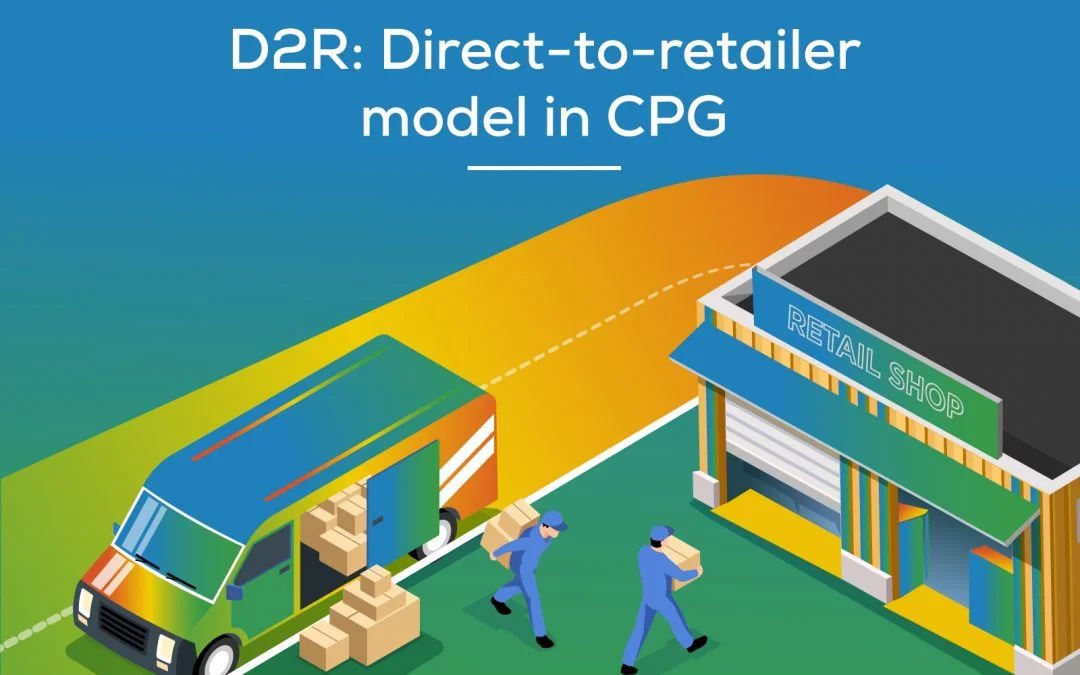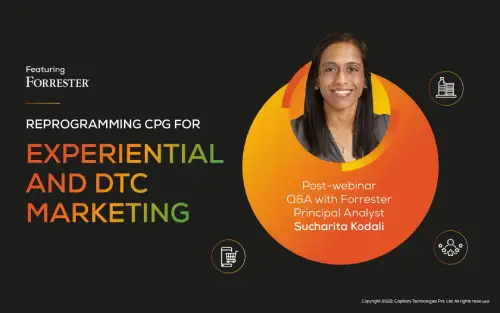- Design industry shaping loyalty programs
- Integrate easily and go live quicker
- Deliver hyper-personalized consumer experiences
Blue Rewards from Al Futtaim Group Shares Loyalty Success Stories and Evolution. Watch Podcast >
Capillary Announces 2nd Annual Captivate 2025 Summit: Transforming Loyalty Management with New AI Tech Read more >

The direct-to-retailer (D2R) model has long been a powerful strategy in the consumer packaged goods (CPG) industry. By connecting manufacturers directly with retailers, it eliminates unnecessary intermediaries and streamlines the supply chain. This approach has gained renewed importance as CPG brands increasingly rely on hyperlocal convenience stores to meet consumer demands efficiently. Strengthening relationships through loyalty channels has become critical in ensuring seamless operations and boosting retail partnerships.
But what exactly does the direct-to-retail model entail, and how can it benefit leading CPG brands? Let’s break it down and explore how this model is transforming traditional supply chains, empowering manufacturers to interact directly with retailers and their end customers.
Direct-to-retail (D2R) is a sales strategy where manufacturers bypass traditional wholesale distribution to sell directly to retailers. This approach fosters transparency, reduces costs for both parties and reshapes the retail landscape. By eliminating middlemen, D2R enhances operational efficiency while maintaining high consumer satisfaction.
This painstaking networking and distribution process has been revolutionized by digitization to create a value-driven model in CPG, leading to the new-age D2R (direct-to-retailer) and D2C (direct-to-consumer) pathways. While D2C has been adopted at a wide scale through online commerce, retailers and their hyperlocal convenience stores too play a crucial role in mitigating fulfillment obstacles. There was a lot of demand sensing an immediate action required from retailers during lockdowns, as in the case of the CPG industry – it didn’t make sense to sell all fast-moving goods online.
The retailers’ role became especially indispensable. This is primarily for two reasons.
D2R is essentially the pathway that allows for a direct licensing contract between brand owners and retailers – eliminating middlemen who squeeze margins.
Once a D2R agreement is effective, the retailer becomes the seller of the licensed merchandise. Products often also get manufactured and then sold directly by the retailer, who becomes responsible for their in-store marketing, while paying a royalty to the brand owner. Businesses and retailers are, thus, coming together to foster healthy growth for both parties. While businesses benefit from the increased margin, private-label push reduces product development/delivery time, and retailers ultimately reap increased profits by building their own enterprises in collaboration. This is precisely where the role of building loyalty programs to reward retailers for their own growth as well as the licensor’s penetration becomes crucial. But, first, let’s look at the D2R model more closely within the purview of CPG brands.
Direct-to-retailer deals allow for long-term associations that prevent CPG products from going out of stores with the highest footfall. In the wake of massive supply chain disruptions, while enterprises are struggling to meet their D2C fulfillment goals, established CPG businesses innovated heavily through existing D2R relationships.
These CPG giants wanted to offer new products or improve the formulation of existing ones during the pandemic. However, without retailers, gathering customer intelligence for product innovation is tricky for fast-moving brands since they are primary storehouses for varied data points. For CPGs, the growing need for new and advanced health and wellness-related products after the pandemic meant collaborating with retailers to gather effective customer expertise that determined their course. Establishing the right relationships with the right retailers proved crucial to getting access to retailers’ inside intelligence as well as having proactive conceptual discussions for the new launches.
If a direct-to-retail property is underperforming, retailers will generally try changing the product in some way (the design or material, for example) before taking it off the shelf. If it is forced to remove it then the chances are it will look for other properties from existing partners. Once a retailer partnership is formed, it generates incremental value for long periods and is self-sustaining with the right set of rewards in place.
The enduring benefits of D2R are clear in the CPG industry, and so the reliance on retailers will remain despite D2C growth. To ensure long-term relationships between CPG brands and convenience stores, there needs to be sufficient incentivization through digital communication channels. Most licensors believe that retailers may not be committed to them beyond the initial push-off phase where they are merely establishing new product lines. This fear can be eliminated effectively and seamlessly through D2R loyalty programs that not only reward retailers but establish consistent relationship-building between the owners and licensees.
A loyalty channel activation can not only enable rewards for retailers but also provide CPGs with the relevant customer insights needed. Brands can then anticipate, quantify, and predict future purchase trends.
A singular retailer communication and rewards portal, that shares updates on the CPG owner’s performance, new launches, and other relevant moves, facilitates trust building to encourage further collaboration. It also becomes the loyalty channel that provides the brand owner with the relevant customer insights it needs from retailers. Brands can then anticipate, quantify, and predict future purchase trends. PepsiCo did this to effectively engage with 40,000 convenience stores at once while incorporating a customizable loyalty program into its proprietary retailer platform.
The Direct-to-Retailer (DTR) approach is redefining the CPG landscape, offering enterprises the opportunity to streamline operations, build stronger retailer relationships, and deliver seamless customer experiences. As brands pivot to embrace this model, the ability to foster trust, transparency, and seamless collaboration becomes paramount for success.
At Capillary, we understand the unique challenges and opportunities within the Direct-to-Retail framework. Our robust loyalty solutions are designed to help enterprises create seamless customer experiences while nurturing brand affinity. By leveraging advanced analytics, AI-driven insights, and personalized engagement strategies, Capillary empowers brands to thrive in a competitive market and build lasting relationships with their retail partners.
Ready to elevate your DTR strategy? Partner with Capillary to drive your direct-to-retail strategies. Talk to our Loyalty Experts to know more!
Direct-to-retail (DTR) is a business model where consumer packaged goods (CPG) brands directly partner with retailers, bypassing traditional intermediaries. This approach streamlines supply chains, improves retailer relationships, and enhances the efficiency of inventory management.
Unlike traditional models that rely on distributors or wholesalers, Direct-to-Retail allows brands to connect directly with retailers. This results in better control over pricing, promotions, and product placement while fostering a stronger brand-retailer relationship.
D2R marketing helps brands build tailored campaigns, enhance brand visibility, and foster retailer loyalty. By leveraging data insights, brands can create personalized promotions and improve product assortment to meet retailer-specific needs.
Loyalty solutions enable brands to reward retailers for their engagement and performance, nurturing long-term relationships. Advanced loyalty platforms like Capillary’s provide data-driven insights and personalized rewards, ensuring seamless customer experiences and strong brand affinity.
Adopting a DTR strategy requires overcoming challenges such as building robust retailer relationships, streamlining logistics, and managing inventory efficiently. Leveraging tools like Capillary’s loyalty solutions can help brands address these challenges effectively.

March 28, 2022 | 4 Min Read
With more than one-third of consumers continuing to switch b

February 17, 2022 | 4 Min Read
The explosion of data and digitization has curiously made th

February 14, 2018 | 4 Min Read
Indian Consumer Goods/FMCG distribution has always been a dy